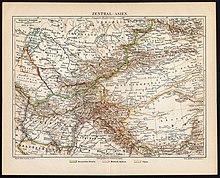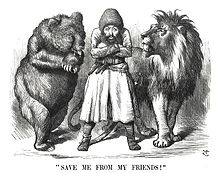Anglo-Afghan wars
The Anglo-Afghan Wars were three military interventions by the British Empire in Afghanistan between 1839 and 1919. The aim of these wars was to secure British supremacy in this area and to put a stop to the expansionist efforts of the Russian Empire . This Anglo-Russian policy is also known as The Great Game .
First Anglo-Afghan War 1839 to 1842
In 1837 Russian and British interests escalated into a conflict between the Shah of Iran and Dost Mohammed , ruler of Afghanistan. Lord Auckland , the British Governor General of Calcutta, then decided with the Shimla Manifesto of October 1, 1838, to overthrow Dost Mohammed and to install the previous ruler, Shodja Shah Durrani . In order to emphasize this demand, around 16,500 British and Indian troops and around 35,000 servants and family members marched over the Bolan Pass into Afghanistan under the command of General Keane . On November 23, 1840, Dost Mohammed surrendered to the British leader William Hay Macnaghten . Some of the British troops were withdrawn and a division under the command of Major General Elphinstone remained in Kabul. At the beginning of November 1841 an uprising against the British occupation began. At Christmas 1841 Macnaghten was killed by Afghans who also cut ties between Kabul and India . The British division was now encircled and practically under siege. On January 1, 1842, Elphinstone signed a contract granting him the trigger. In return, he handed over some of his weapons and supplies. On January 6, 1842, Elphinstone began withdrawing from Kabul. The goal was to reach the next garrison in Jalalabad , about 140 kilometers away. A total of 17,000 people were in the train. They were attacked as soon as they left the garrison. The attacks continue and the promised escort did not appear. Several negotiations broke out along the way and Elphinstone was left hostage. In the days that followed, the army at the Chaiber Pass was completely destroyed. In response to this defeat, a punitive expedition was sent out. Two armies under General George Pollock and General William Nott shocked Jalalabad and Kandahar in the spring. Thereupon they marched on Kabul. In Kabul, Akbar had meanwhile lured Shodja Shah Durrani from the citadel of Bala Hissar and murdered him. After the capture of Kabul and the enthronement of Shuja's son, the hostages were rescued. The former commander Elphinstone had passed away. On October 11, 1842, troops from Kabul and, subsequently, Afghanistan withdrew completely to India after the British East India Company concluded that the continued occupation was too risky and costly. Dost Mohammed returned to the throne and ruled until his death in 1863.
Second Anglo-Afghan War 1878-1880

The Second Anglo-Afghan War occurred in 1878. After its success in the Russo-Ottoman War of 1877/78 , Russia turned again to Central Asia, where it had ruled West Turkestan since 1868 . In July 1878 the Russians succeeded - much to the annoyance of the British - in placing an envoy in Kabul, where Dost Mohammed's third eldest son, Shir Ali , ruled as emir . The Viceroy of India Lord Lytton protested and in September instructed General Neville Chamberlain to also secure the right of representation in Kabul. However, its mission was intercepted by the Afghans and forced to turn back. The British then marched into Afghanistan with strong forces from the British Indian Army . Shir Ali fled to Russia, which he hoped would support him, but died in Mazar-e Sharif in February of the following year . After the British occupied a large part of the country, his son and successor Mohammed Yakub signed the Treaty of Gandamak in May 1879 , which gave the British not only the right to reside in Kabul and other cities, but also control over Afghanistan's foreign policy gave. In September 1879, however, the new British resident in Kabul, Louis Cavagnari, was murdered with his entire staff by rebel Afghans. This marked the beginning of the second phase of the war, in which the British under General Frederick Roberts occupied Kabul in October, where they were besieged in December. In 1880 Roberts appointed Abdur Rahman , son of Dost Mohammed Afzul Khan's eldest son, as the new emir. Another son of Shir Ali, Ayub Khan , who had stayed at Herat in the west of the country , defeated a British army in the bloody battle of Maiwand in July 1880 , but was defeated by Roberts in September after besieging the survivors in Kandahar 'Troops defeated at the Battle of Kandahar . The new British government elected in April 1880 under William Ewart Gladstone was satisfied with what had been achieved and in 1881 decided to withdraw the troops.
Third Anglo-Afghan War 1919
In the third Anglo-Afghan war in May 1919, the Afghan army under Amanullah Khan, who came to power in the same year, was able to achieve greater successes against the British, initially with the support of all tribal warriors. In return, the British bombed Amanullah's palace. On August 8, 1919, in the Peace of Rawalpindi, Afghanistan was provisionally recognized as a sovereign and independent state by Great Britain.
literature
- Saul David: The greatest failures in military history. From the battle in the Teutoburg Forest to Operation Desert Storm (= Heyne 19, Heyne-Sachbuch 833). Heyne, Munich 2003, ISBN 3-453-86127-2 (deals with the withdrawal from Kabul in 1842).
- Charles Miller: Khyber. British India's North West Frontier. The Story of an Imperial Migraine. Macdonald and Jane's, London 1977, ISBN 0-354-04167-3 .
See also
- Military Campaigns in Northwest British India (1849-1910)


